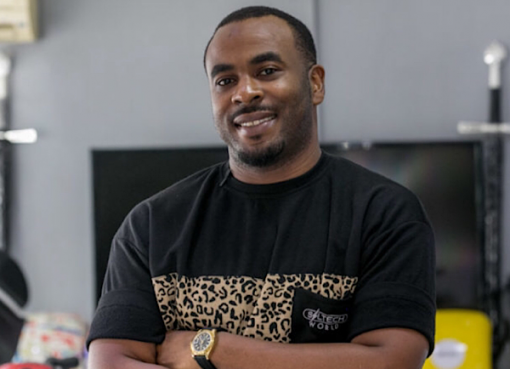Kendall Ananyi is the Chief Executive Officer and Co-Founder of Tizeti Network Services that provides unlimited Internet to Africa starting with Nigeria. In this interview with FEMI ADEKOYA, he talks about the company’s strategies in overcoming some start-up challenges and ongoing efforts to deepen broadband penetration in Nigeria and neighbouring countries. He also talks about the challenges of doing business in Nigeria and what government needs to do to make the National Broadband Plan achievable. Excerpts.
Deploying internet service over Wi-Fi is often described as a daunting challenge in a metropolitan state like Lagos, considering interference, congestion and other construction issues. How have you been able to deploy this service as a last mile operator?
Usually doing business in Nigeria is so challenging. When we first started we thought of doing something around video-on-demand (VOD) that is movies, but we found out that the real challenge was that the Internet service wasn’t great in the 3G days; secondly the cost of the data was expensive. So, we decided that the bigger problem was what we should focus on— the Internet itself, instead of the services that run on the Internet and provide unlimited service.
Although what really made us go ahead was that we had already figured out the technology on VOD but no sooner as we were about to launch, Swift Network cancelled their unlimited service. For us, that was like we didn’t have the distribution for the product we wanted to sell and that wasn’t good. We built our base station in an estate and we saw the uptake was good. From there we kept on getting referrals.
In terms of operation before you can actually provide service to the mass media you need to have a license, so we applied to the NCC for a license and we got approved. So, that way regulatory wise we were okay to provide the service. Than secondly in order to use Wi-Fi you also need to get license spectrum from the NCC, we also did that and got the license; but the problem is that policing the band is difficult because other people are not supposed to use the band but they still do. And this is what causes interference.
We have reported to the NCC and as you will see in NCC’s first quarter report, a smaller competitor is using our spectrum to operate illegally, thereby reducing our quality of service. Our customers are complaining. We knew they were using it but we didn’t want to be confrontational. That was why we went through the right channel using the NCC. But that still doesn’t stay you can’t keep on going to the NCC every day, week, or month, so you have to manage the situation as best as you can. Secondly, one other challenge was the cost of power. In the telecom industry, you will be informed that one of the main problems is diesel operational expenses. The logistics of getting diesel is high. We were once there, but we moved to solar power and that has helped us a lot.
As we expand to various areas we now have smaller offices that provide support to the area. So instead of having one central office we are now breaking up our public locations to smaller areas so that the distance of commute to provide support when customers need it is shorter. We have been able to overcome some of the challenges.
How have you been able to manage competition?
Telecom is a very competitive space. But if you carve a niche for yourself in any industry and execute well, you will be sought after. For us, it was more of executing a pure, unlimited service. Not the one that you cap. You can download whatever you want. In a day people download up to 150GB on the average, more than what you get on other networks. So, it became obvious to people that we don’t steal from them and our unlimited is actually unlimited. To the best of my knowledge no one gives good service like us or do what we do.
We now got a strong referral from people actually using the service and that has propelled our growth. So, if you are a heavy user, we are the ones that can meet your demands and it still cost competitively. You have something that is unlimited and at a cheaper rate. The only thing you risk is mobility. For mobility, we have solved it with hotspots around Lagos. To the best of my knowledge, no one gives good service like us or do what we do.
Capacity for Wi-Fi transmission is limited on 5-gigahertz [bands] to a few hundred megabits per second, which is a great start, but demand for data is ballooning and that is not likely to serve for long. With growing demand for data, especially in era of Internet TV, how do you hope to manage this challenge?
Spectrum is an unlimited resource that is why it’s licensed and all. You build out of your network; you can build into slow or smaller cells. When we started off as a telecom provider we wanted to build our bars to cover a large area as tall as possible, but over time you will want to split out each area into smaller cells. In Oniru, we had only one tower cell, but in the last two months we now have five different towers strategically located to cover smaller areas. This addresses the problems of congestion and distance to connection. We are able to serve more people than we were able to do before due to just one tower serving an entire area. It is also not as capital expenses as to what we built the first time. This is because these are smaller towers; they are not just tall, large but covering a smaller area. So, the quality of service automatically improves and we can then continue to replicate it across several areas. While we were building our coverage within an area, we also densify the areas where we have a lot of customers. We are trying to make connections shorter to improve our service to the people.
Also, because it is an unlimited service and we use Google GNS, a lot of people enjoy using the internet because it is unlimited. What happens is that because the customer repeatedly uses Google’s GNS, the IP address get throttled. This is because high data usage is often perceived as an abnormal activity for Nigeria. We have talked to Google and the engagement is all going. We may end up setting up our own GNS.
Do you think Nigeria can meet its National Broadband Plan to deepen penetration by 30 per cent before the end of the year, considering the present level of deployment?
From where the company is, we have not achieved 30 per cent penetration in Lagos. You can imagine penetration across the entire country. A lot more can be done in terms of fundraising; in terms of simplifying regulatory requirements. For us, we have been very lucky. Government has a bigger role to play in solving some of the regulatory bottlenecks that are required, as well as allowing fibre providers to have right of way. The more fibre we have, the better people get connected as it is the same backhaul infrastructure that both Wi-Fi and fibre has. The more fibre we have, the better it is for us. It is not as if there are no investors, there are companies that want to partner with Nigerians. I will advise potential investors to explore the option of metro fibre. It will encourage the deployment of Wi-Fi services and deepen broadband penetration.
On your expansion project, you seem to be looking at other West African markets when there is need yet to be met in other regions of the country. Lagos is yet to be served. What is the strategy considering your growth rate and opportunities in the Nigerian market?
The straightforward answer is a double-throng approach. This is because it takes time to build the business in any African country today. To get to where we are today, it took time. It took a while before the provided service gets to people. We are starting off in this country because it is going to take us time to get to where we are in Nigeria. We are starting a ground work to get us going so that in two years’ time, we will be there. We are taking a long-term approach and not just rushing into things. We are trying to build a company of the future. It takes time to get credits and even licenses. In Nigeria, it took us six months to get our license. In Ghana, it is taking way longer than that.
So, before you get to where you even start delivering the customer different services, there is a huge time for that, which is what we are trying to do. Our expansion plan is not stopping our execution in Nigeria.
We chose Ghana because with the resources we have, the market does not have much of a power problem and Google has an expansive fibre network that you can connect to and that reduces the cost because the kind of radios we use for wireless are actually expensive. This reduces the company’s capital expenditure in terms of power and backhaul. For us, it is no brainer for us to start replicating what we are doing in Nigeria when we know it will take a while to get to where we are in Nigeria.
By first quarter 2019, we should have been done with Lagos. We have already started Oyo and Ogun. Every environment is peculiar and we wish we could just turn on the switch. By the time you hear about us in Ogun or Oyo State, we would have been there for at least 9-12 months. That is the same reason we are commencing the process in Ghana. We are very cautious in making a lot of noise when the service has yet to be deployed. No need putting the cart before the wheel. The market is there. Just deliver and execute properly.
It is often assumed that because people are on a shared IP address unlike you being on a dedicated IP address there are issues if someone is consuming more, than when you are probably on a dedicated IP address. How are you addressing this?
In the last two months, we have moved 75% of our customers to dedicated IP; dedicated in the sense that it’s a pool depending on the time it is being used. It has also helped to improve the service. We now have more IP addresses. The truth is that IPv4 is exhausted. Everyone should be moving to IPv6. This will soon happen as we will get to a point where there won’t be more IP addresses to be allocated. It has been slow to move, even though there are a lot more IP addresses available. For now, customers can only share. What sharing does is that it affects customers’ experience of the service as one customer may be using the internet on an IP and it would affect you sharing the same IP because it could be blocked somewhere at that time. Those are things we have to deal with at the back end.











21 thoughts on “‘Broadband penetration target achievable with relaxed regulatory requirements’”